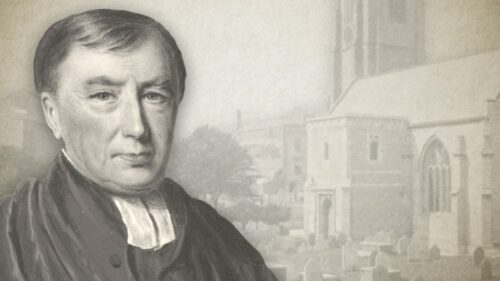
August 31—Morning Devotion
“One thing I know, that, whereas I was blind, now I see.”—John 9:25
This is a great thing to say, my soul: on what foundation dost thou rest this knowledge? If the Lord Jesus hath opened thine eyes, then indeed thou canst not but discover thy former blindness; for during that state of nature thou literally couldst discern nothing. And if thy former blindness be discovered, then thy present sight hath brought thee acquainted with new objects. Pause over the review of both this morning. Tile blindness of nature to spiritual things is marked in scripture in strong characters. A poor blind sinner sees nothing of the light of life. The Sun of Righteousness is not risen upon him. He discerns nothing of the love of God in Christ. If he reads the scripture, the vail is upon his heart. If he hears of Jesus, he sees no beauty in him. Nothing is nearer to him than the Lord, and nothing further from his thoughts. To tell him of the sweetness of the word of God, is strange to him; for he tastes nothing of sweetness in it. To tell him of the loveliness of ordinances and the sabbaths; these are strange things in his esteem. My soul, if indeed thine eyes be opened, thou wilt know that thou wast once indeed blind, in the fullest sense of the word, to all these delightful views of sacred things, which now are thy supreme pleasure and thy joy. Say, then, what hast thou seen to justify this saying: “One thing I know, that, whereas I was blind, now I see?” Hast thou seen the king in his beauty? Hast thou seen with the eye of faith the glories of Jesus? Yes, if so be all other objects are obscured. The sight of Jesus, as the Christ of God, hath darkened the glory and excellency of all beside, Jesus, as he is in himself, as he is in his offices, characters, relations; as he is to thee and thy happiness; is the one, the only one thing needful; and thou must count all things but dung and dross to win Christ. These, my soul, are blessed tokens that Jesus hath opened thine eyes, and brought thee out of darkness into his marvellous light. By and by thou shalt see him as he is, and dwell with him for ever.
Robert Hawker (1753-1827) was an Anglican (High-Calvinist) preacher who served as Vicar of Charles Church, Plymouth. John Hazelton wrote of him:
“The prominent features…in Robert Hawker's testimony…was the Person of Christ….Dr. Hawker delighted to speak of his Lord as "My most glorious Christ.” What anxious heart but finds at times in the perusal of the doctor's writings a measure of relief, a softening, and a mellowing? an almost imperceptible yet secret and constraining power in leading out of self and off from the misery and bondage of the flesh into a contemplation of the Person and preciousness of Christ as "the chiefest among ten thousand and the altogether lovely." Christ and Him crucified was emphatically the burden of his song and the keynote of his ministry. He preached his last sermon in Charles Church on March 18th, 1827, and on April 6th he died, after being six years curate and forty-three years vicar of the parish. On the last day of his life he repeated a part of Ephesians 1, from the 6th to the 12th verses, and as he proceeded he enlarged on the verses, but dwelt more fully on these words: "To the praise of His glory Who first trusted in Christ." He paused and asked, "Who first trusted in Christ?" And then made this answer: "It was God the Father Who first trusted in Christ."
Robert Hawker on the Biblical Covenants (Complete)
Robert Hawker's Poor Man's Morning Portions





